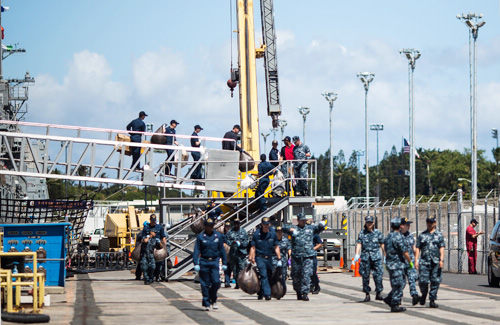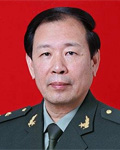|
 |
|
MILITARY PRESENCE: Naval personnel disembark from the guided missile destroyer USS Stockdale in support of the Rim of the Pacific 2012 exercise in Pearl Harbor, Hawaii, on June 29 (XINHUA/AFP) |
 The China Strategic Culture Promotion Association, a Beijing-based NGO, issued two reports on the military power of the United States and Japan in June. The reports evaluated the countries' military strategy, strength, deployment as well as their military relationships with other countries in the past two years. This was the first time a Chinese non-governmental think tank released evaluation reports on other countries' military affairs. Beijing Review reporter Ding Ying interviewed Luo Yuan, a retired major general and Executive Vice President of the association, and shared his opinions about the reports. Edited excerpts follow: The China Strategic Culture Promotion Association, a Beijing-based NGO, issued two reports on the military power of the United States and Japan in June. The reports evaluated the countries' military strategy, strength, deployment as well as their military relationships with other countries in the past two years. This was the first time a Chinese non-governmental think tank released evaluation reports on other countries' military affairs. Beijing Review reporter Ding Ying interviewed Luo Yuan, a retired major general and Executive Vice President of the association, and shared his opinions about the reports. Edited excerpts follow:
Beijing Review: What messages is the China Strategic Culture Promotion Association trying to send by releasing the reports?
Luo Yuan: The core message we're trying to send is that all countries in the world should respect each other and treat one another equally. The United States and Japan should refrain from persistently meddling in other countries' military affairs. China has the right to make objective evaluations about their military development, so as to give Chinese people and the international community an impartial view of the two countries' real military power. We hope to reach the targets of enhancing trust and reducing misgivings by issuing the reports.
Why did you choose to focus on the United States and Japan in your reports? Will the association continue to issue reports on other countries' military strength?
We chose to create the reports because of the current situation. The United States shifted its strategic alert from the former Soviet Union to China. The U.S. Congress requires that the Department of Defense release a report on China's military power every year. Japan also issues defense white papers criticizing China's military development. Their reports on China not only exaggerate China's military strength, but also further the so-called "China threat" theory.
Although the Chinese Ministry of National Defense and Ministry of Foreign Affairs lodged solemn requests to stop such rhetoric, the two countries have stayed the course. Under these circumstances, we decided to reciprocate by issuing the reports highlighting their real military power.
We have considered issuing reports on other countries besides the United States and Japan. However, we are focusing on the two nations to stay on top of their irresponsible comments about Chinese military power. We also are studying our neighboring nations. The reason is that we must have a general view of the security environment in our region.
U.S. Secretary of Defense Leon Panetta announced at the Shangri-La Dialogue in Singapore in early June that China is not the target of the United States' increasing military forces in the Asia-Pacific region. Do you think the announcement is truthful?
We must judge the United States' purpose by its deeds, not just by its words. Surely it would be best if China truly is not Washington's target. However, at least for now, Chinese people are very confused about U.S. activities. On what basis has the United States returned to the Asia-Pacific? Does the security situation of the region pose a threat to the United States? And are there any Asia-Pacific countries making the United States feel the necessity of sending more troops to the region? The United States now deploys six of its 11 aircraft carriers and 60 percent of its nuclear submarines to the region. If China is not the target, then what is? The United States always shouts that China should be more transparent about its military strength. It should then be militarily transparent to China as well as the international community.
Panetta claimed that his country tried to keep a strategic balance in the Asia-Pacific by sending more troops there. But according to our report, the United States actually has caused an imbalance in the region. During the Cold War, the United States kept a strategic balance by maintaining 100,000 troops respectively in the Asia-Pacific and Europe. Now it has radically shifted its strategic focus to the Asia-Pacific. Currently, it has 135,000 troops in Asia, and 85,000 in Europe. There are 618 U.S. military planes deployed in Asia, while in Europe there are 290. The United States has stationed 80 warships in Asia and 22 in Europe. Obviously, its strategic balance is skewed to the Asia-Pacific. It should give a reasonable explanation to China, Asia and the whole world.
| 